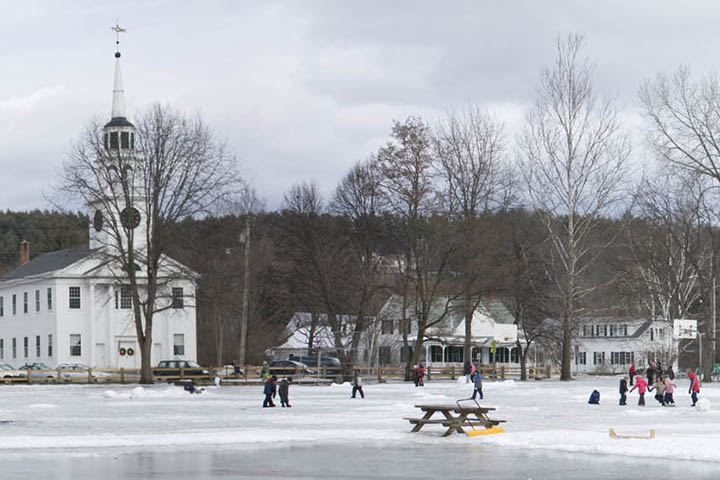Karen Crouse set out to research Norwich, VT, for a book about athletic development. She ended up writing about an extraordinary town, where the residents have deep and meaningful practices for forming their children.


Karen Crouse set out to research Norwich, VT, for a book about athletic development. She ended up writing about an extraordinary town, where the residents have deep and meaningful practices for forming their children.
Norwich is a town of about 3,000 that lies directly opposite the New Hampshire border in eastern Vermont. Crouse’s original fascination in the town developed due to the significant number of Olympic athletes it’s produced—11 in total and three who have come home with medals.
Unlikely as it was that there was “something in the water” of the Connecticut River that flows past the town, Crouse wanted to explore what it was in Norwich’s athletes that made them successful on one of sports’ grandest stages.
However, she didn’t discover state-of-the-art training facilities build by a local philanthropist, or parents who pegged their children into one sport from an early age and had them train as if they were 25. In her words: “I came to realize that Norwich’s secret to happiness and excellence can be traced to the way the town collectively raises its children. It is an approach that stresses participation over prowess, a generosity of spirit over a hoarding of resources and sportsmanship over one-upmanship.”
Some parents encourage participation in sports because they want their child to have a more rounded resume, or because one day they dream of their child being awarded an athletic scholarship. While these are commendable goals, Norwich parents would tell you that they miss the primary target of participation in sports. “Parents encourage their kids to simply enjoy themselves because they recognize that more than any trophy or record, the life skills sports develop and sharpen are the real payoff,” says Crouse.
She has found three themes that guide parenting in Norwich, and they could be adopted by anyone in any community—even if you don’t find yourself raising children in an idyllic New England town: “Treat Your Neighbor’s Child as Your Own . . . Frame Sports as Fun . . . [and] Let Kids Own Their Activities.”
There is a certain level of common sense at work in these tenets, but anyone familiar with the often hyper-competitive world of youth sports will see that they are also a valuable reminder of sport’s true essence. In working together to focus on fundamentals, Norwich parents have created an environment in which their children are likely to grow into their full potential.
“In Norwich it’s not that the parents don’t want their children to be successful. They definitely do. It’s just that they are encouraging them to cultivate skills that will serve them in the long run,” says Crouse. This investment pays dividends beyond athletic performance. When Norwich athletes end their careers, some return to volunteer with local children and help build excitement around future competitions.
Crouse is describing what James Davison Hunter and Ryan S. Olson call the “moral ecology” of a community in The Content of Their Character, a new book from the Institute for Advanced Studies in Culture. “When social institutions—whether the family, peer relationships, youth organizations, the internet, religious congregations, entertainment, or popular culture—cluster together, they form a larger ecosystem of powerful cultural influences. None of these is morally neutral. Indeed, all social institutions rest upon distinctive ideals, beliefs, obligations, prohibitions, and commitments—many implicit and some explicit—and these are rooted in, and reinforced by, well-established social practices. Taken together, these form a ‘moral ecology.’”
Norwich has a beautiful “moral ecology” that we can learn from and imitate.
Positive Coaching Alliance has resources for parents, coaches, athletes, and leaders that can help the community come together around using sports as a developmental opportunity.